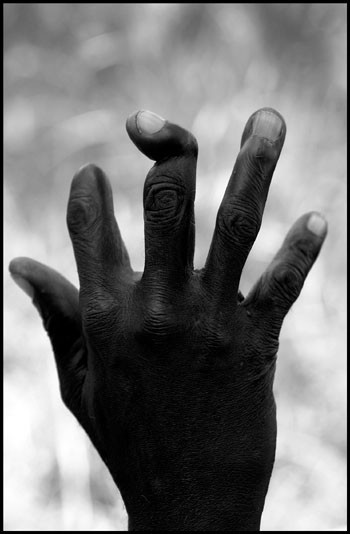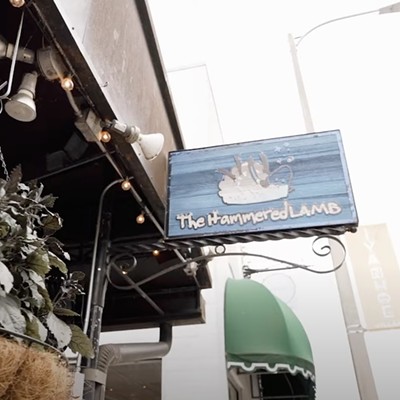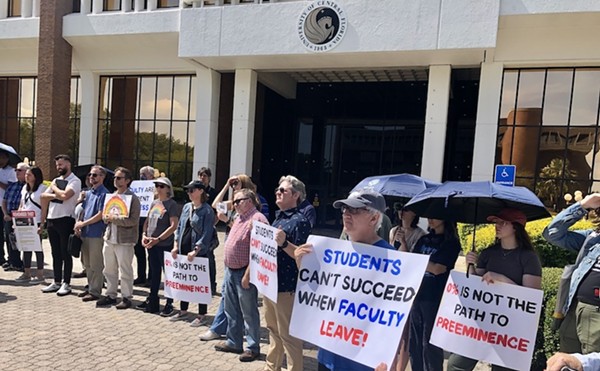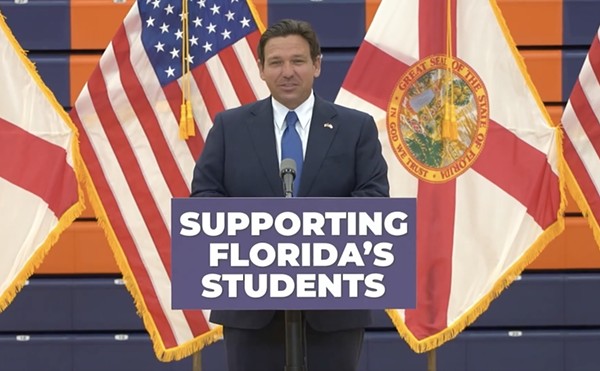Tom Simbo is familiar with the word "torture." Simbo, a 50-year-old pastor from Sierra Leone, follows the headlines and knows what happens in places like Guantanamo Bay and Abu Ghraib.
But lately, the TV set at the Simbos' has been gathering dust. As Americans continue to discuss what constitutes torture and when it's justified, Simbo can't stomach the debate. He can't understand why some Americans are justifying something inhumane — something he knows from personal experience is wrong.
"I don't want to see this crap where the news praises the government, even though they're doing nasty things," he says. "In Africa, I `had` this every day. I come to America, and this is what I see? I gave it up."
Torture may be an abstract concept and a fleeting thought for most Americans, but for Simbo and his family, it's real. During the course of the 10-year civil war in Sierra Leone, Simbo and members of his immediate family were kidnapped, raped, enslaved and disfigured.
As June 26 marked this year's annual United Nations Day in Support of Torture Victims, experiences like that of the Simbos remind us that an estimated 130 countries continue to practice torture — including the United States. Despite efforts by the United Nations and Amnesty International to condemn such acts, the practice is alive and well. Thanks to nonprofits like Colorado's Rocky Mountain Survivors Center, one of 23 programs in the country — including the Florida Center for Survivors of Torture in Clearwater (see sidebar, page 24) — families like the Simbos can find mental health counseling, as well as access to legal support and social services to help deal with their trauma.
Having received political asylum in January 2005, the Simbos now have a bit more breathing room. As they move on, they face an American culture that can't comprehend the debilitating effects torture has on individuals, as well as entire communities.
Unlike most Americans, when the Simbos start thinking about torture, they can't just turn off their TV sets.
"`Americans` don't see the big picture, and the reason is because there's only a glimpse on the news. You go on to work and your life activities," says Tom. "For me, I `saw` it day to day. My country has several thousand amputees — that is a strong reminder of what took place."
Left for dead
Many characterize Sierra Leone's 10-year conflict as one that was fueled by greed and corruption. While the country is rich in diamonds and gold, its profits were largely shared among the elite. A poor education system and a high number of unemployed kids in the early '90s provided recruits for the Revolutionary United Front, which quickly earned a name for itself by attacking government officials and civilians indiscriminately.
Throughout the war, Simbo used his skills as a religious figure in the community to speak out against the conflict. Long after other nonprofits had packed up and left, Simbo worked with the Interreligious Council of Sierra Leone (IRCSL) to advocate peace.
According to some experts, the IRCSL was the most effective nongovernmental organization during the civil war. In addition to teaching classes and providing what little relief aid he could through the IRCSL, Simbo held a weekly, national call-in radio show. Every Sunday morning, Sierra Leoneans would call in to ask Simbo about the growing conflict, corruption and other moral and political issues. Every week, Simbo would denounce the war, its destruction and the inexplicable brutality associated with it.
"People `would` ask, ‘What do you think of these people who are doing this?' I would say, ‘Well, it doesn't matter who does it or why they do it — it's wrong. And it is ruining every other fabric of the government system.' The brutality of people killing people for their property is wrong," he says.
Simbo says he was only standing up for his convictions, a trait he says has been ingrained in him since childhood, but his weekly radio broadcasts created more than a few enemies.
The rebel leaders viewed Simbo as a threat because he spoke out against their brutality, while the established government at the time saw Simbo's criticism of corruption and other government practices as problematic.
As a respected leader, Simbo traveled regularly with other pastors and imams to attend IRCSL conferences to curb the violence. In Sierra Leone, Christianity and Islam are the two primary religions. Traveling north in 1996 with colleagues, Simbo's vehicle was stopped by rebel militia searching for food.
"These guys stayed in the bush for a good amount of their life," he says, "They demanded that we all exit from the vehicle, and they started taking us and separating us."
The Muslim leaders were separated from the Christian leaders. After being stripped of his wallet, Simbo was taken from the rest of his companions into the heart of the Sierra Leonean jungle.
Simbo was treated as a slave, forced to carry water to the camp and serve food to the rebel leaders. There were a few other individuals in the camp, including a woman Simbo says was used as a sex slave.
That first night, after talking to a female prisoner, a rebel stormed up to Simbo with a bayonet. Grabbing Simbo's leg, he pushed Simbo on the ground.
"I'm going to disfigure you so you don't ever use women," said the young man.
Using the detachable blade, the man sliced into Simbo's calf, from his knee to his foot. Then he lit a candle, forced Simbo to take off his clothes, and poured the hot wax on Simbo's genitals.
"He said, ‘You raped my wife.' I was like, ‘What are you talking about? I don't know this woman — all I'm doing is the work that you assigned me.'"
Simbo soon figured out that the woman had denounced him to the leader, though he did not know why. With no sympathy forthcoming from rebel leaders and no medical help at hand, Simbo used leaves in the jungle to stop the bleeding from his wound. Two days later, West African peacekeepers came into the area, and the rebel camp dispersed. Abandoned, Simbo crawled to what looked like a footpath. When local villagers saw Simbo, they assumed he was part of the militia.
"They were scared," he says. "I shouted that I was a pastor and my van was ambushed. They came and they were hesitant, but managed to put me on their shoulders and brought me to the village."
With no medical supplies in the town, the villagers carried Simbo to a popular highway hoping that a stranger would pick him up and take him to the capital. Though he was grateful to be alive, the hospital he was eventually taken to had few supplies, and doctors could do little but scrape his wounds clean — without anesthesia.
Weeks later, Simbo learned at an IRCSL meeting what happened to his colleagues.
Most had escaped to safety, but one had been murdered and left dead in the jungle.
For Elizabeth Simbo, there was an overwhelming sense of relief to discover her husband was still alive.
"When we heard that the rebels attacked, I just thought, ‘I've lost my husband, and the rebels have killed him.' I was hopeless. I wasn't having any sleep any longer. When I went to the hospital, I was again hopeful. At least he's alive," she says.
Besieged
As the years progressed, there was little question for Simbo about scaling back his controversial role.
"I speak up with what I'm convinced about — no matter what. That was the way that I was brought up," he says. "My friends say that I'm arrogant or too forceful. If I'm convinced that it's wrong, it doesn't matter that you have a gun against me, I'll say that it's wrong."
When the violence grew worse in Freetown, the Simbos evacuated the city to live in nearby Guinea.
Living in the French-speaking country was stressful. The Simbos were luckier than most because they didn't live in a refugee camp. Modest funding from a church in the United States gave them enough money to rent a small apartment.
During their sojourn, police detained the Simbos' daughter Janet while she was traveling to school. It happened to be Janet's birthday.
With little information about what had happened and why, Elizabeth worried that the government was going to deport the whole family and push them back into war-torn Sierra Leone.
"I was thinking that they were going put us on the boundary and just leave us there. I was afraid that they would take our daughter — it was really difficult for me," she says.
Early the next morning, Janet was released and went home to her parents.
The Simbos returned to Sierra Leone after two weeks in Guinea. While there was some respite from the violence, in 1999 rebel forces invaded Freetown again, initiating what was perhaps the bloodiest conflict of the war. This time, the Simbos fared far worse than before.
While there was plenty of random violence during the conflict, rebels targeted prominent government officials, the wealthy and religious leaders during the raid. One of the rebel groups sought out Tom Simbo and held him at gunpoint while Elizabeth and the children hid inside the house.
"I recognize you," the gunman said, holding the cocked weapon. "You're a pastor, and you guys pray against us. I'm going to suck your blood — I'm going to kill you."
One month earlier, Simbo had taught a series of classes to young rebels, aimed at curbing the conflict. While Simbo didn't recognize the gunman, he knew exactly who Simbo was.
"What do you have to say for yourself?" the gunman asked.
"The only thing I can say is there are many mouths that depend on me," Simbo said. "I will go to heaven if I die now."
For some inexplicable reason, which Simbo can only describe as an act of God, the young man dropped his weapon and hugged him.
"I don't know what got into me," he said. "Pray for me."
Giving Simbo five thousand leones (about $2.50), the gunman went to join his colleagues. As he was leaving, he shot the Simbo's family dog, which was following him.
Unable to hear the conversation that went on between her husband and the gunman, many in the neighborhood, including Simbo's own family, assumed that the gunshot had killed Simbo.
"When we heard `the gunshot`, I started crying," says Elizabeth. "All the people around the area were crying. They said, ‘Pastor Simbo is gone.'"
It wasn't until the family dog ran into the Simbos' home and died in their bedroom that Elizabeth realized her husband was alive.
"We decided not to sleep in the house, and it was really wise for us," says Elizabeth. "That night they were coming to kill all of us."
Tom and his family sought shelter at a neighbor's home with plans to evacuate Freetown. It turned out that their inclination was a good one; the next day they found their home had been burnt to the ground.
But the horror wasn't over.
Their two oldest daughters were taken at gunpoint and forced to serve the rebels. One daughter was raped. After two days, the girls managed to escape when they were sent to fetch water for the rebels.
Tom's father was also killed in the January uprising. Bedridden and sick, Tom's father could not evacuate and leave with the rest of his family. When the rebels entered his home, they shot him immediately. Tom suspects that his political activities led rebels to target his father.
Reunited with what was left of his traumatized family, Tom fled Freetown once again.
Out of harm's way
After evacuating to Guinea for one month after the Freetown incident, the Simbos returned to Sierra Leone and started life again. Between 1999 and the war's end in 2001, they worked closely with the IRCSL to bring relief to Sierra Leoneans. During that time Tom trained more than 800 young militia recruits in a U.N. program aimed at giving recruits skills so they could abandon their weapons.
After the war was declared over, Simbo started researching master's counseling programs for crisis intervention. Thanks to financial support from a Baptist church, which raised money for his family's evacuation, Simbo and his family were able to come to the United States in 2002 for his graduate education.
Wanting to give back to his country, Simbo raised money in the United States to bring books, clothing and other supplies back to Sierra Leone in 2004. Simbo saw it as part of an ongoing effort to maintain ties to his native land.
After staying in the country for about two weeks, which was barely enough time to get his items cleared through customs, Simbo started to hear rumors that government supporters were "looking for him."
The government had a bone to pick with Simbo. Simbo wrote a controversial letter to the IRCSL in 2001, dismissing some of the government's tactics for dealing with the rebels. Because the letter was critical of the state, many government officials viewed it as openly supportive of the rebel factions.
It wasn't until Simbo left his sister's house to stay with a friend that he understood his life-or-death predicament.
"I think you're in danger," said his friend. "I'm hearing some rumors that government supporters are coming after you because you're a rebel collaborator."
Simbo promptly smuggled himself to the airport, then flew back to the United States two weeks early.
Upon his return, Simbo told his wife and children what he had encountered. After years of strife, the family had a frank discussion about their future in Sierra Leone.
"When I came back from the trip, I said to my family, ‘We have lived our lives to help our people, but we haven't been in a winning situation. My government sees me as a collaborator, the rebels see me as a supporter of the government. If we go back now, it might not be too safe for us.'"
Through a friend, Simbo learned about the Rocky Mountain Survivors Center and began using the center's legal resources to apply for asylum.
While they originally planned to stay in the United States for a few years, the Simbos are now on their way to becoming U.S. citizens.
Although he was initially reluctant to apply for asylum, Tom says that it was the right choice for his children and wife.
"I didn't want to do anything to put them in harm's way," he says. "In many ways we are safe and secure here."
A better tomorrow
It wasn't until Simbo started his counseling program in the United States that he, his wife and kids received trauma counseling.
"People looked up to us to give help," he says. "The expectations were that that because we were leading and training, we didn't need help."
While his wife and children aren't returning to Sierra Leone anytime soon, Simbo says he wants to go back. Now that he has finished his counseling degree, he believes he can have the most impact in his home country.
"I don't want to stay in America all my life," he says. "My dream and my goal is to be of help in any way possible to my compatriots."
Depending on the outcome of the elections next year, Simbo says he may consider returning home for a visit.
"My dilemma because of marriage makes it difficult. I don't want to endanger them because of my own convictions," he says. "My heart is still in Sierra Leone. I believe that I can speak more for people and do more there."
In the meantime, Tom works at the Grand Hyatt in downtown Denver. It's not nearly as satisfying as his previous line of work, but it pays the bills while he looks for a job, he says.
Curious in nature, Tom says he sometimes talks to the homeless who frequent the area. While he doesn't want to criticize them, Tom says that Americans — even the homeless — have a level of comfort that many Africans could never imagine.
In America, even the homeless have certain luxuries that are hard to come by in Africa. The only luxury that Africans have, says Tom, is persistence and the expectation that tomorrow will be a better day.
"The typical American knows that there's a place to sleep and a certain amount of governmental facilities to keep you going without a job," he says. "In Africa, there's hope in the future. People don't know comfort and pleasure as they do here. Why do you think that people in Darfur are living the way they're living? The people in Uganda with the AIDS? It's that once there's life, there's hope — that's what keeps people going."
A version of this story appeared originally in Boulder Weekly.
ABOUT THE PHOTOS: Pulitzer Prize—winning photographer John Kaplan was awarded the Overseas Press Club Award for Feature Photography in 2003 for his series of photos on survivors of torture in West Africa, some of which were used with his permission to illustrate this story. The series documents atrocities committed in civil wars in Sierra Leone and Liberia. This work, which has been displayed internationally, was also recognized by the Robert F. Kennedy Foundation. Kaplan was also honored by the RFK Foundation for his coverage of the disadvantaged in the United States. Kaplan is a professor of photography, design and international journalism at the University of Florida.
|
TORTURE SURVIVORS IN FLORIDA
The Florida Center for Survivors of Torture, which has been operating in Tampa Bay for six years and in Miami for one year, will provide treatment and services, for little or no cost, to about 200 torture victims this year. Its goal is to help survivors become fully functional, productive community members who can obtain the aid they need independent of the Florida Center's help. Stacie Blake, administrator of the Florida Center, says she uses a "center without walls" model. "We want our clients to find the services they need within their communities," she says. After an initial assessment and psychological evaluation, a case manager is assigned to victims and helps develop a plan that addresses medical, psychological and legal needs. The Florida Center recruits and trains a network of providers, such as psychiatrists, social workers, attorneys, physicians and interpreters. The Florida Center, a program of Gulf Coast Jewish Family Services Inc., is one of more than 30 member organizations in the National Consortium of Torture Treatment Programs. It is funded by donations from the United Nations Voluntary Fund for Victims of Torture, the Federal Office of Refugee Resettlement and private, local donors. Its clients are refugees, asylum seekers and undocumented aliens. A large number of the clients served in Tampa Bay are Bosnian and Colombian, and many of those served in Miami-Dade are Cuban and Haitian. The Florida Center has helped people from over 40 countries, including Albania, Sudan, Sierra Leone, Vietnam and Iran. Though torture is a poor means of extracting information — people will say anything if they are being physically harmed — it is a very effective means of control, Blake says. The long-term effects of torture include an inability to sleep, nightmares, flashbacks, a lack of trust, an inability to make or maintain relationships with friends and family and feelings of guilt and shame. All these things make it difficult for survivors to acculturate to the United States, Blake says. Treatment methods differ based on the survivor's country of origin or experience. For example, victims who come from a country where people don't normally talk to therapists are often reluctant to receive mental health help. But, Blake says, these clients sometimes change their minds after seeing their peers have success with the method. The hardest part of helping survivors is the "absolute recognition that torture is perpetrated today all over the world," says Blake. "That's very painful to recognize." — Megan Schumacher |



















